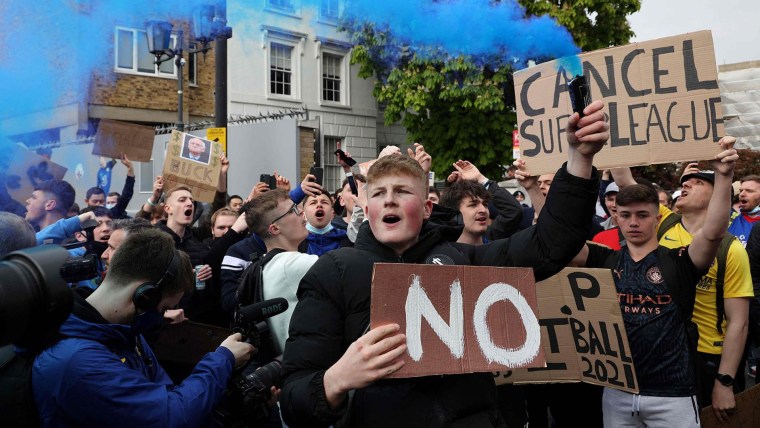The seemingly failed plan for 12 European soccer clubs to form a breakaway European Super League ripped through the sport like an explosion. The dramatic outgrowth of a mundane battle over prize money soon began to fall apart, however, following fan protests, anger verging on calls to arms from pundits, opposition from the players and the wrath of several European governments. The clubs involved gambled on the appeal of the sport’s biggest star players. But their bid to remove themselves from the charm of snakes-and-ladders style national soccer pyramids ruined the concept.
Soccer is structured to allow the mighty to fall — the very thing the Super League wanted to avoid.
Soccer is structured to allow the mighty to fall — the very thing the Super League wanted to avoid. Deportivo La Coruña, Blackburn Rovers and Kaiserslautern are names that barely register internationally. These teams were all champions of major European leagues a generation ago. Since then they have all tumbled down into the equivalent of minor leagues. They play a lot of their games these days at small uninspiring stadiums and rarely get shown on TV. Stop them falling and you would also close the door on another team climbing to the top, however. You would dash a lot of dreams.
The European Super League idea, predictably, was motivated by money and power. There is no shortage of either at any of the clubs that were involved — backed by a confluence of American financial backers, a Russian oligarch, an Emirati and a couple of Chinese conglomerates — but all would have been glad to have more of both.
The teams planned to share at least $6 billion every season, a lot more than is shared among the 32 teams in the current UEFA Champions League, the competition the new European Super League aimed to replace. They would also have cut out the administrators.
The clubs made little attempt to sell the proposals to a skeptical public before their collapse, beyond a very dubious claim that it was a response to fans’ desires. Near universal outrage resulted.
Among many mistakes made, the idea of a forced break from soccer’s competitive structure was perhaps the biggest flaw.
The temptation of seizing the place of the Champions League in European soccer and making it a closed shop was obvious for owners. Liverpool won the competition in 2019 and were English Champions in 2020 but this year are in a real struggle to become one of four English teams to qualify, and they face a $70 million financial hit if they don’t make it. If the Super League idea had gotten off the ground, they would have been guaranteed a spot in its successor competition every year, as would the other 11 founding clubs. It would have been like the 16 teams who make the NBA Playoffs this year deciding they will be in the playoffs every year from now on, no matter the conference standings.
The most lucrative European competitions have limited spots — part of a reality that can be cruel and inspiring in equal measure. It has been apparent for months that Schalke, a wonderful historic team from a blue-collar German city, is going to drop down from the German Bundesliga this year into the country’s less glamorous second division, as the two bottom clubs in the Bundesliga standings must do every year. Relegation like this can be devastating for a team’s finances. It can also work the other way though: Well-run clubs can continually climb the complicated pyramid that makes up the European division system; in theory you could start a team with a group of friends tomorrow and rise to the top of soccer in a number of years. This could never happen in the United States.
Soccer’s meritocracy has long been skewed by wealth, but while the current elite clubs are comfortable in their status, things do change over time.
Soccer’s meritocracy has long been skewed by wealth, but while the current elite clubs are comfortable in their status, things do change over time. Manchester City is the best team in England these days and would have been among the favorites to win a European Super League. Yet it spent a few years in the English soccer equivalent of the minor leagues around the turn of the century, and back in 2003 was knocked out of European competition by a team from a small Polish farming town. In 1994, a team of Swedish semi-professionals, IFK Göteborg, finished ahead of two other Super League teams, Barcelona and Manchester United, in a Champions League group. Mass cup competitions — over 700 teams enter the English FA Cup each year — give teams from tiny villages or the London police force a theoretical chance of making it through to play millionaire stars in the final rounds.
Cutting itself off from the reaches of the rest of the game, like giants cutting away the beanstalk, may have backfired for the European Super League anyway, had the idea survived. Loyalty remains a powerful force among European soccer fans. Despite not being German champions for over 60 years and lacking star players, Schalke (clearly not good enough to get a Super League invitation) regularly attracts some of the biggest crowds in the world.
If threats to expel the Super League clubs from their national leagues and the Champions League had materialized, the rump of clubs left would still have had lots of fans, plus a new anti-elite appeal. Super League clubs that became complacent, performed badly or had financial struggles would have appeared downright farcical to soccer fans used to seeing weak teams slide down the relegation snake. The Super League’s elitism, instantly subject to ridicule, probably meant it never had a chance. It hoped to artificially define greatness in a sport that operates a merit-based system, designed for greatness to emerge naturally. After the embarrassment over their failed breakaway has subsided, the clubs involved may well realize they had a lucky escape. This big idea might seemed destined to strand them on an island of their own greed.
Source: | This article originally belongs to Nbcnews.com










